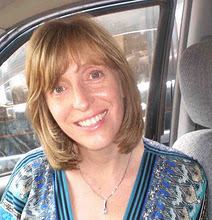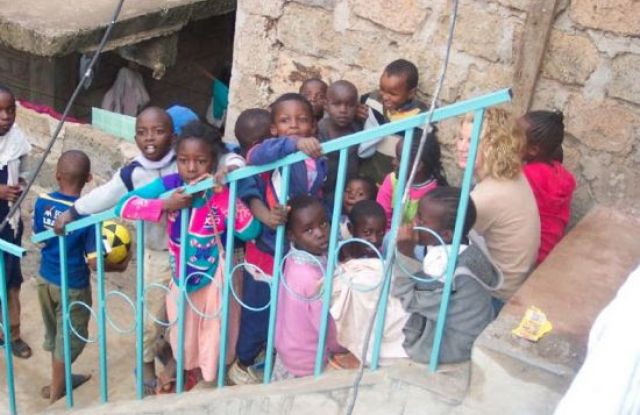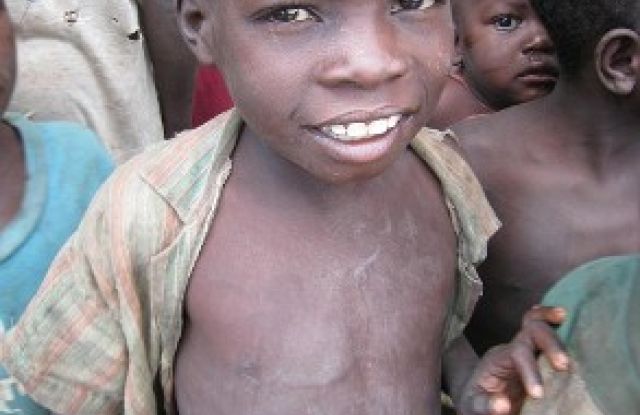

Poverty up close and personal wrecks you
 Four years ago, I tracked down Kari
Four years ago, I tracked down Kari
Miller, a Minnesotan school teacher who is spending her summer with
widows and orphans in Uganda. I’ve been a booster of hers ever since. She loves the left-out and has a heart to
give others the chance to be a part of this great adventure to which
the Father is calling all his children. Her writing transports me.
From Wrecked for the Ordinary:
Poverty and suffering from a distance are tolerable. It is easy to walk
away from it and believe that things are not really as bad as they look
on TV. However, it is quite another when the underweight snot nosed
child stares up at you, clings to your skirt and asks you for your time
and attention.
I walked slowly up to a three room concrete home. A woman showed up at
the door with three little children clinging to her skirt. She smiled
broadly, hugged me and welcomed me into her home. We sat in a small
room where pictures on walls are reminders of her deep pain of loss.
Joyce is an Acholi from Northern Uganda. She grew up in a war zone,
learning early how to run from the fighting and where the best places
to hide were.
 One
One
day, she heard the familiar sounds of bullets and soldiers, so she ran
to hide. After the violence was over, she returned home to find her
parents in a pool of their own blood. She was a terrified fifteen
year-old, but she pulled their bodies from the open space and prepared
them for burial. After their death, she stayed with some of her
relatives until she got married. One day soldiers killed her husband,
forcing her to leave the northern part of Uganda with her small
daughter.
Then, just last year, her only daughter was killed in a traffic
accident in Kampala. As if that was not enough, her remaining siblings
have all died due to war and AIDS, so she is now caring for fifteen of
her siblings’ children. I am not sure even how fifteen children fit
into those three rooms.
As I was getting up to leave she grabbed my hands and began to cry,
“I’m alone. Everyone in my family is dead and I am the only one
remaining. Why? Why did I live?” I reached my arms around her and then
I looked her in the eye and said, “I see you. I hear you. I see the
pain on your face, but I don’t know why God allows some to die while
others live. Please know that I will not forget you and neither will
the people who hear about you.” We prayed and asked God to intervene in
her life and to provide for her children. God seemed to be crying with
us. He was present. Then we talked about the new land that is coming
and the people in America who have decided to support her and the other
widows. Slowly, a small bit of hope began to spread across her face.
Joyce asked me to visit her friend. She told me that this woman was
really suffering. I was still trying to take in the great sense of loss
I felt from her, so I wasn’t sure what she meant by “a woman who is
really suffering.” Her friend was also Acholi and had come south after
soldiers killed her husband. Some of her children have now died and she
is caring for six of her grandchildren. As we came to her dwelling, I
suddenly understood Joyce’s concern.
This elderly woman and her children were living in an old bathhouse. It
is a small structure originally intended for people to use for bathing
and it had fallen into disrepair, as it had not been used for many
years. It smelled moldy and musty. It was very dark and dank inside and
not fit for a goat, let alone a woman and her six children. They have
no furniture and lie on the floor to sleep. They must use a neighbor’s
outhouse. It has no house number, as it is slated to be condemned. It
was never intended to be used as a home. It was so difficult not to
just break down and cry. I wanted to scream and get angry at the
injustice of it all. How can this be happening? All I could do was hold
her and pray. There was more righteous anger in that room than just
mine. The Holy Spirit seemed to be present and his righteous anger over
this injustice seemed to dwarf my own. I felt that divine presence so
clearly; I almost thought it might become visible.

I spent seven hours going from house to house, hearing one story of
loss after another. experiencing God’s presence as I prayed with each
widow. I held poverty’s hand and looked suffering in the eye. I
embraced them and was shocked to find the God of the universe there. It
seems he dwells there.
God loves these women, and he will not rest until his followers take
notice and do something about it. Pray, but do not forget to act. Over
the last few weeks, some people from the United States have listened to
God’s love for the widows and decided to take action.
They have sent money for these widows to purchase a land of their own
where they can build new homes for themselves. They have begun to
partner with these women to meet their needs. We are a new generation
of Christ-followers that know the beauty of embracing the poor. Next
time you see poverty, whether from a distance or clinging to your
skirt, stay there in that moment. Know them, pray for them and do
something about it.
“Sing to God, sing praise to his name, extol him who rides on the
clouds—his name is the Lord—and rejoice before him. A father to the
fatherless, a defender of widows, is God in his holy dwelling.” -Psalm
68:4-5
Kari is trying to raise $13,000 dollars to purchase land for 100 widows
and their children. This is a major undertaking, so your help in
spreading the word would be greatly appreciated. To make a donation,
make out a check to “Christ Presbyterian Church” (or CPC). Put
“Cornerstone Widows Ministry” in the memo section and mail to:
CPC
Attn: Missions Department
6901 Normandale Blvd
Edina, MN 55435



Leave a Reply